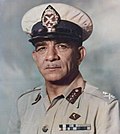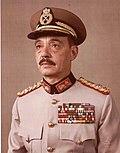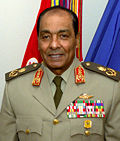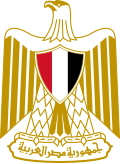| No. | Portrait | Minister | Title | Took office | Left office | Time in office | Defence branch | Ref. |
|---|
| 1 | | Naguib, MohamedMajor General
Mohamed Naguib
(1901–1984) | Armed Forces Commander-in-Chief (1952)
Minister of War and the Navy,
Armed Forces Commander-in-Chief (1952–1953) | 24 July 1952 | 18 July 1953 | 359 days |  Egyptian Army Egyptian Army | [3] |
| 2 | | Boghdadi, Abdel LatifWing Commander
Abdel Latif Boghdadi
(1917–1999) | Minister of War | 8 July 1953 | 7 April 1954 | 273 days |  Egyptian Air Force Egyptian Air Force | [3] |
| 3 | | Amer, Abdel HakimMajor General
Abdel Hakim Amer
(1919–1967) | Armed Forces Commander-in-Chief | 7 April 1954 | 31 August 1954 | 146 days |  Egyptian Army Egyptian Army | [3] |
| 4 | | el-Shafei, HusseinLieutenant Colonel
Hussein el-Shafei
(1918–2005) | Minister of War | 17 April 1954 | 31 August 1954 | 45 days |  Egyptian Army Egyptian Army | [3] |
| (3) | | Amer, Abdel HakimField Marshal
Abdel Hakim Amer
(1919–1967) | Armed Forces Commander-in-Chief (1954–1956)
Vice President of the Republic, Minister of War,
Armed Forces Commander-in-Chief (1956–1962) | 31 August 1954 | 29 September 1962 | 8 years, 29 days |  Egyptian Army Egyptian Army | [3] |
| 5 | | el-Beshry, Abdel Wahab Abdel Wahab el-Beshry | Minister of War | 29 September 1962 | 10 September 1966 | 3 years, 346 days |  Egyptian Army Egyptian Army | [3] |
| 6 | | Badran, Shams Shams Badran
(1929–2020) | Minister of War | 10 September 1966 | 10 June 1967 | 273 days |  Egyptian Army Egyptian Army | [3] |
| – | | el-Beshry, Abdel Wahab Abdel Wahab el-Beshry
Acting | Minister of War | 19 June 1967 | 22 July 1967 | 33 days |  Egyptian Army Egyptian Army | [3] |
| 7 | | Howeidi, Amin Amin Howeidi
(1921–2009) | Minister of War | 22 July 1967 | 24 February 1968 | 217 days |  Egyptian Army Egyptian Army | [3] |
| 8 | | Fawzi, MohamedGeneral
Mohamed Fawzi
(1915–2000) | Minister of War,
Armed Forces Commander-in-Chief | 24 February 1968 | 14 May 1971 | 3 years, 79 days |  Egyptian Army Egyptian Army | [3] |
| 9 | | Sadek, Mohammed AhmedGeneral
Mohammed Ahmed Sadek
(1917–1991) | Minister of War,
Armed Forces Commander-in-Chief | 14 May 1971 | 26 October 1972 | 1 year, 165 days |  Egyptian Army Egyptian Army | [3] |
| 10 | | Ali, Ahmad IsmailGeneral
Ahmad Ismail Ali
(1917–1974) | Minister of War | 26 October 1972 | 28 December 1974 † | 2 years, 63 days |  Egyptian Army Egyptian Army | [3] |
| 11 | | el-Gamasy, Mohamed Abdel GhaniGeneral
Mohamed Abdel Ghani el-Gamasy
(1921–2003) | Minister of War,
Armed Forces Commander-in-Chief | 28 December 1974 | 4 October 1978 | 3 years, 280 days |  Egyptian Army Egyptian Army | [3] |
| 12 | | Ali, Kamal HassanGeneral
Kamal Hassan Ali
(1921–1993) | Minister of Defense and Military Production,
Armed Forces Commander-in-Chief | 4 October 1978 | 13 May 1980 | 1 year, 222 days |  Egyptian Army Egyptian Army | [3] |
| 13 | | Badawi, AhmedLieutenant General
Ahmed Badawi
(1927–1981) | Minister of Defense and Military Production,
Armed Forces Commander-in-Chief | 14 May 1980 | 3 March 1981 † | 293 days |  Egyptian Army Egyptian Army | [3] |
| 14 | | Ghazala, Abd Al-Halim AbuField Marshal
Abd Al-Halim Abu-Ghazala
(1930–2008) | Minister of Defense and Military Production,
Armed Forces Commander-in-Chief | 4 March 1981 | 15 April 1989 | 8 years, 42 days |  Egyptian Army Egyptian Army | [3] [4] [5] |
| 15 | | Abu Taleb, Youssef SabriLieutenant General
Youssef Sabri Abu Taleb
(1929–2008) | Minister of Defense and Military Production,
Armed Forces Commander-in-Chief | 15 April 1989 | 20 May 1991 | 2 years, 35 days |  Egyptian Army Egyptian Army | [3] |
| 16 | | Tantawy, Muhammad HusseinField Marshal
Muhammad Hussein Tantawy
(1935–2021) | Armed Forces Commander-in-Chief,
Minister of Defense and Military Production | 20 May 1991 | 12 August 2012 | 21 years, 84 days |  Egyptian Army Egyptian Army | [3] [6] |
| 17 | | el-Sisi, Abdel FattahField Marshal
Abdel Fattah el-Sisi
(born 1954) | Armed Forces Commander-in-Chief,
Minister of Defense and Military Production | 12 August 2012 | 26 March 2014 | 1 year, 226 days |  Egyptian Army Egyptian Army | [3] [7] |
| 18 | | Sobhy, SedkiGeneral
Sedki Sobhy
(born 1955) | Armed Forces Commander-in-Chief,
Minister of Defense and Military Production | 27 March 2014 | 14 June 2018 | 4 years, 79 days |  Egyptian Army Egyptian Army | [3] [8] |
| 19 | | Zaki, Mohamed AhmedGeneral
Mohamed Ahmed Zaki
(born 1956) | Armed Forces Commander-in-Chief,
Minister of Defense and Military Production | 14 June 2018 | 2 July 2024 | 6 years, 18 days |  Egyptian Army Egyptian Army | [9] |
| 20 | | Saqr, Abdul MajeedGeneral
Abdel Mageed Saqr
(born 1955) | Armed Forces Commander-in-Chief,
Minister of Defense and Military Production | 3 July 2024 | Incumbent | 1 year, 31 days* |  Egyptian Army Egyptian Army | [10] |






















